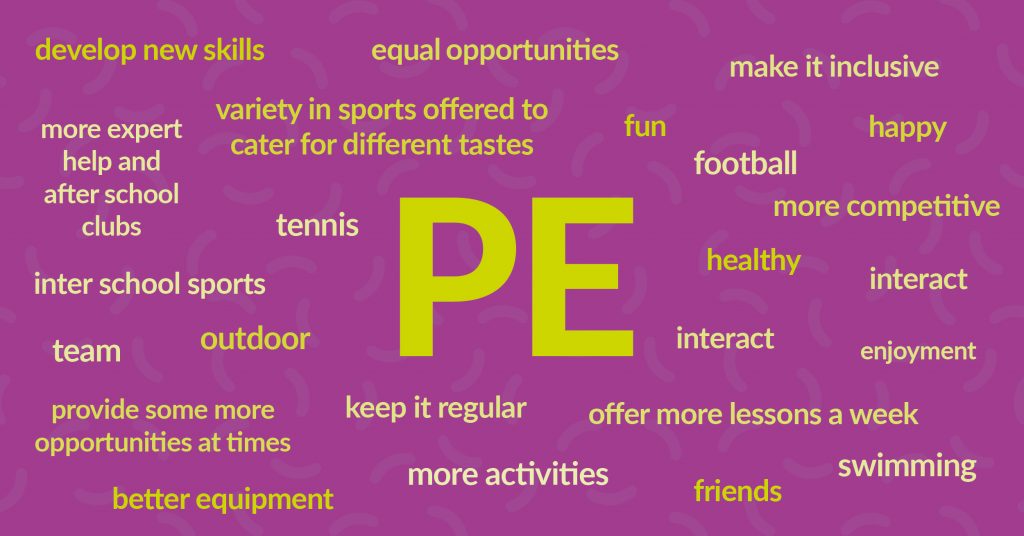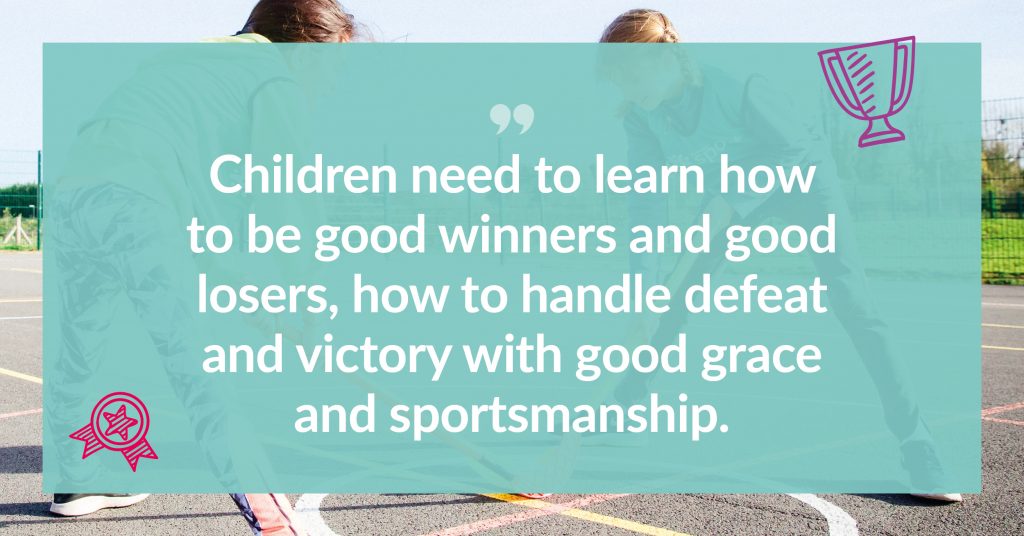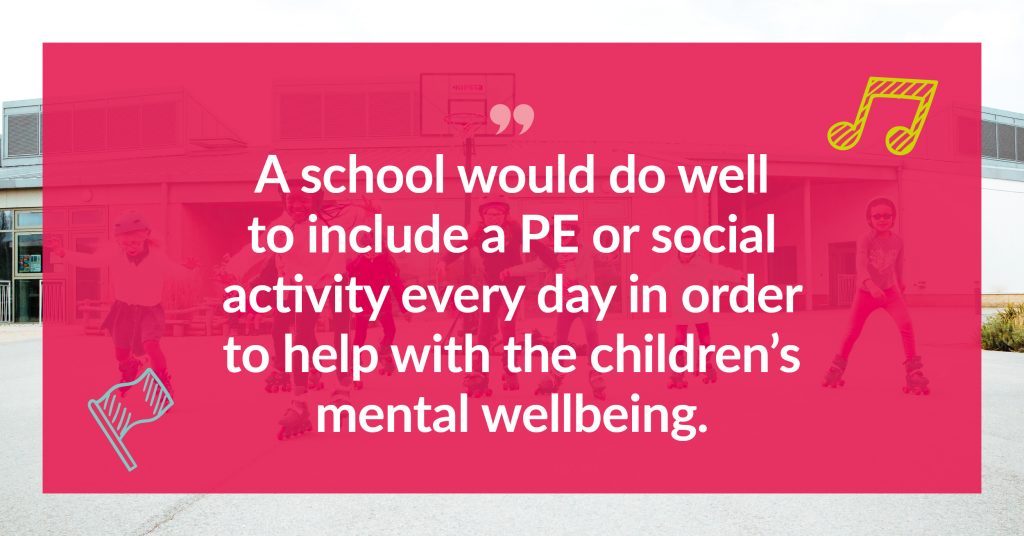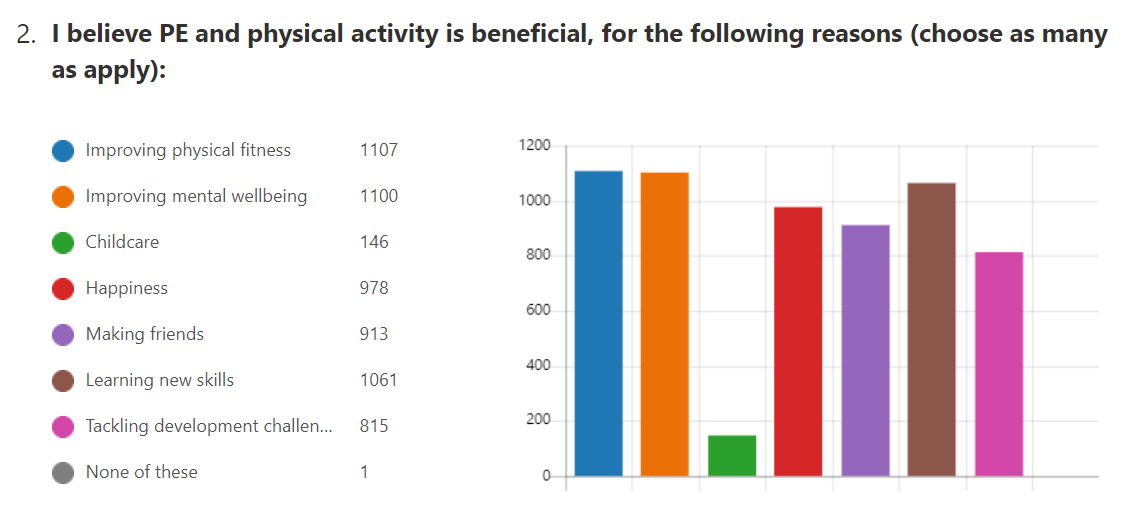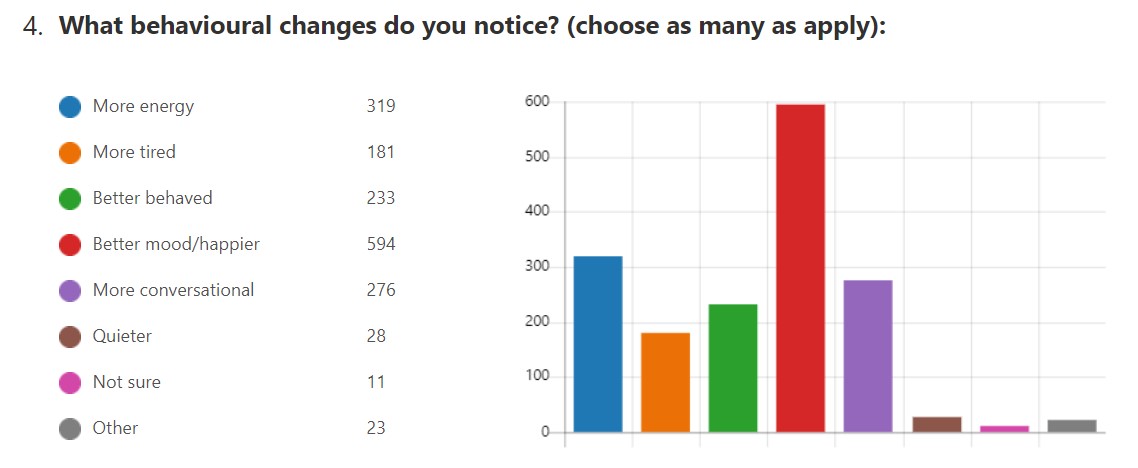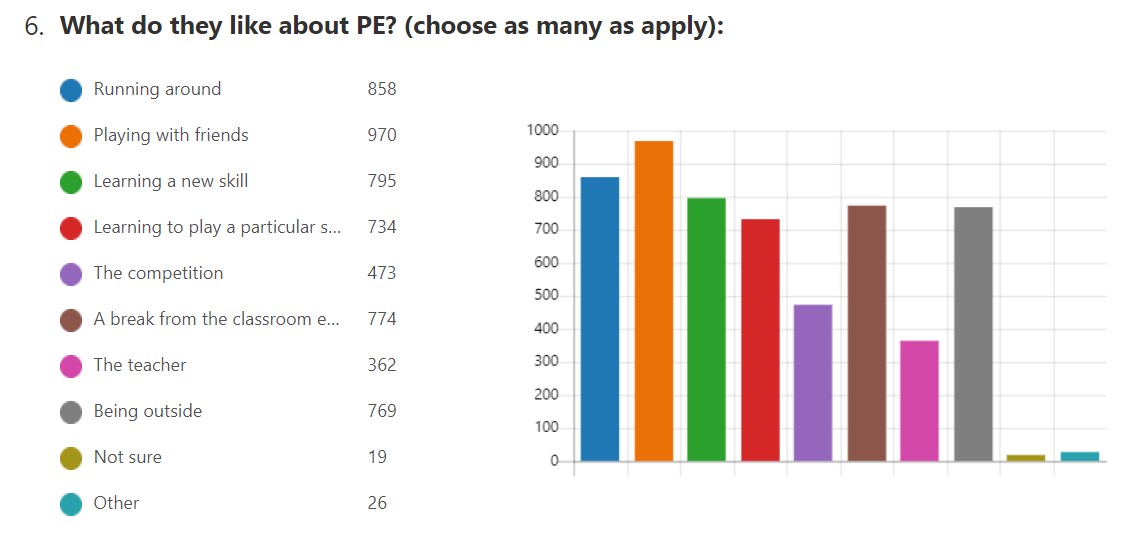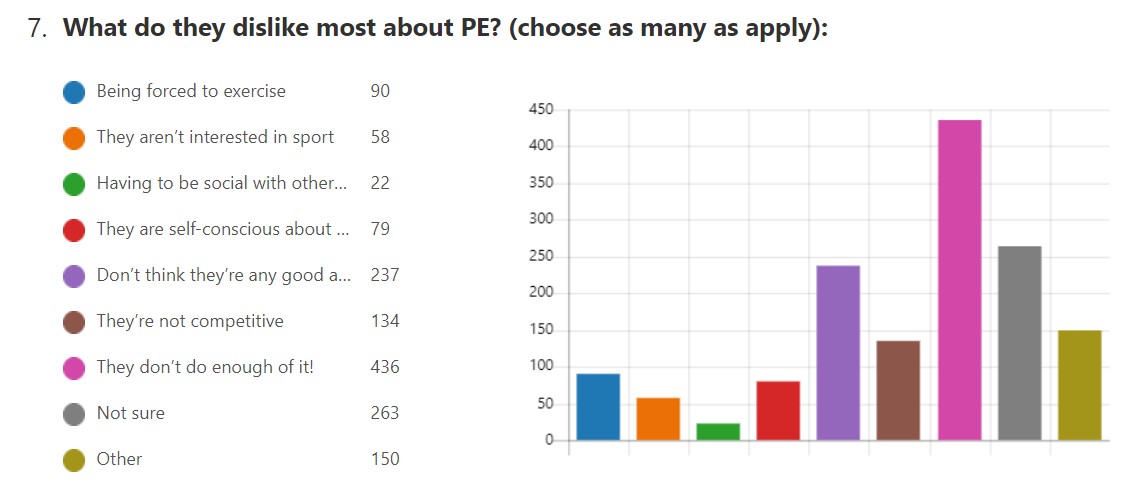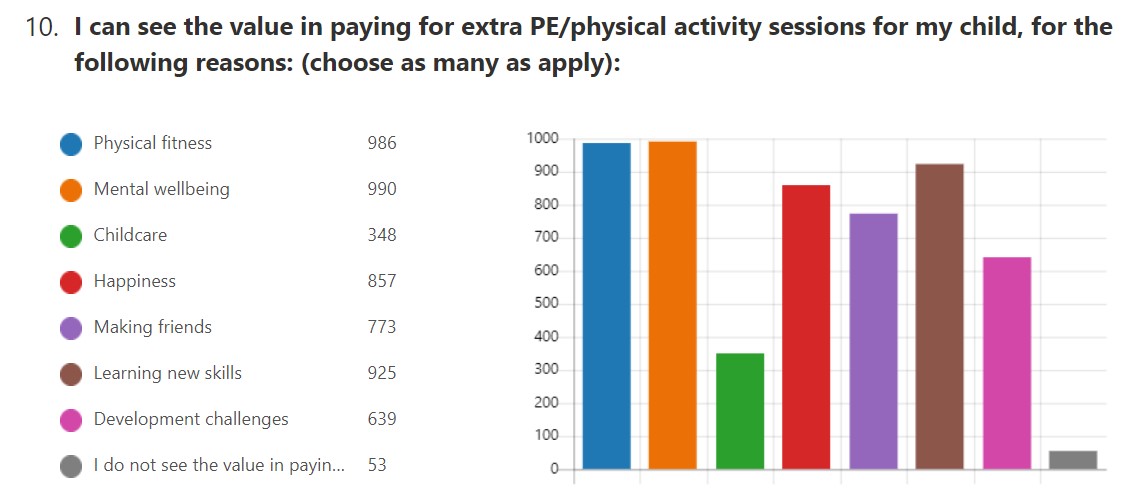Survey: What do parents think of PE and how does it affect child health and wellbeing?
Many parents understand the importance of physical activity for their young children. At Premier Education, we know this because parents send their children to our holiday camps, before and afterschool clubs and wraparound childcare.
Parents know – often first hand – that physical activity helps to support child mental and physical health as well as developing skills such as making friends and communication. Some parents may not know this, others may just be ignoring it. Either way, research shows that too many children are not getting the recommended amount of physical activity.
To better help parents and children, Premier Education wanted to explore the impact of parental views of PE on their children: if the parent disliked PE, does the child? And, if so, how can we help those children enjoy physical activity? What other differences exist between the children of parents who did or didn’t enjoy PE at school?
To do this, we surveyed 1,120 parents of young children and asked them questions about theirs and their child’s views of PE and its impact on them.
Results in a nutshell
- Most parents enjoyed PE at school and think PE is as important as academic subjects
- Most parents see the mental and physical benefits of PE as important, but also, equally important
- Children of parents who didn’t like PE at school are three times more likely to dislike it, which puts children at risk of not getting the benefits of PE
- Parents want more PE in schools, and more variety of activities – especially non-sport-based activities.
Key findings
Parents on PE
- Of our parent respondents:
- 33% said PE was their favourite subject
- 40% said they enjoyed it a little
- 15% said they did PE because they had to
- 12% said they didn’t enjoy PE at all
- 20% of parents say PE is less important than academic subjects
- 60% of parents believe that schools could improve their PE offering
Mental and physical health
- Parents see the mental and physical benefits of PE as equally important (97%)
- 63% of parents can see the difference in their children when they’ve done PE. 53% (the most frequent answer) said it improves the child’s mood. 30% said their child had more energy (17% said they were more tired). 24% said their child was more talkative after physical activity (only 3% said their child was quieter).
- 30% said they would pay for extra physical activity to help with childcare. Other reasons include physical health benefit (87%), mental health benefit (87%).
- 69% of parents say that PE has improved their child’s ability to make friends
Child attitudes towards PE
- When explaining why their children enjoy PE, parents say their children like playing with friends (85%), learning a new skill (70%) and being outside/a break from the classroom (69%).
- What are the reasons children don’t like PE? 8% don’t like being made to exercise. 21% don’t enjoy PE because they don’t think they’re very good at sport. 23% of parents don’t know why their child doesn’t enjoy PE
The impact of parents who disliked PE at school
We wanted to see if parental enjoyment of PE affected a child’s enjoyment. To do this, we split the data by those parents who liked it ‘a lot’ or ‘a little’, and those who did it because they ‘had to’ or ‘didn’t like it’.
- Children of parents who disliked PE are less likely to enjoy PE
- Of parents who liked or loved PE
- 0.8% of children didn’t like it at all
- 87% liked it a lot
- 11% like it a little
- Of parents who disliked or hated PE
- 3% of children didn’t like it at all
- 67% liked it a lot
- 25% like it a little.
The result is marked: Children of parents who didn’t like PE at school are three times more likely to dislike it.
To look at this further, we also split the data by those who would and wouldn’t consider paying for extra physical activity sessions for their child if the mental and physical benefits could be proven.
- 50% of those who wouldn’t consider paying more, did not like PE at school (6% loved it), while only 23% of those who would consider did not like PE (37% loved it).
Of parents who believe PE is less important than academic subjects, 69% disliked PE at school (28% said they loved it). Of parents who saw PE as important as academic subjects, 25% disliked it.
In summary, parents who disliked PE at school, are hindering their child’s enjoyment of PE. At a time when child obesity is a growing problem and few are getting the recommended amount of exercise, this is a problem. Work needs to be done to show parents that physical activity has an important role in child health and wellbeing.
How can schools improve their PE?
We asked parents to let us know how they think schools could improve their PE offering.
While the open field answers are not quantitative, we started to see certain patterns coming through:
- Parents wanted more physical activity and more variety for their children, especially non-competitive, non-traditional activities for those who weren’t ‘sporty’ or ‘competitive’ (The word ‘more’ appeared 569 times in parent responses)
- Parents want PE to address wellbeing and mental health as well as the physical and fitness benefits
- Many parents said that competitive sports were valuable in helping to teach children about real life – you don’t always win!
- Disparities between private and public schools, with the former offering more sports, more often.
The problem with sport
“Children who don’t like PE and aren’t good at it will always be picked last. Think how they feel. This happened to me as a child and it’s not nice.”
“Schools could try to engage and encourage the children who don’t find PE easy or interesting. My children didn’t like PE and sometimes felt very forced, which put them off PE for the rest of their school life.”
“I didn’t enjoy PE because I wasn’t naturally good at it and it wasn’t fun. As an adult, I love being active. A love of physical activity can definitely be nurtured in the right way by making PE fun and less about ability.”
“How schools can improve varies greatly between the state system and the private system. Private schools don’t need extra PE as their days are 8.15-6pm.”
At Premier Education, we know that ‘sport’ and ‘competing’ can be a barrier to the enjoyment of physical activity for many children. We also know that it isn’t as as simple as, ‘if you don’t like sport, do drama’. That’s why we provide multi-sport and multi-activity camps which are designed to engage children of all interests and abilities as well as sport-specific camps. This sets children up for a lifelong enjoyment of physical activity and its health benefits, even if they don’t like competitive sports.
Wellbeing
“I firmly believe that PE can improve a child’s wellbeing and mental health, so maybe include yoga.”
“PE should be done more. It is such an important part of education and wellbeing.”
“There should be more PE to improve children’s mental health and wellbeing.
They should do a run or walk in the morning and afternoon to boost mental well being ready for the classroom.”
“Schools should have a wider range of activities to encourage children to develop lifelong hobbies for wellbeing.”
Conclusion
Most parents value physical activity and PE for their physical and mental health benefits – even those who didn’t enjoy it at school. However, parents who did not enjoy PE at school are more likely to have children who don’t enjoy it, and they’re less likely to advocate/invest in its use to help build physical and mental wellbeing. As such, there is work to be done to help educate and encourage these parents to help their children enjoy physical activity or they may miss out on its benefits.
The second main finding is that parents want more PE in schools, but want it to include a wider variety of activities to help non-sporty children enjoy it.
At Premier Education we specialise in helping schools deliver physical activity in primary schools. We help engage all children with a wide variety of activities from basketball and active play to dance and drama. Teachers can get in touch to see how we can help their school deliver great physical activity for its pupils, and parents can get in touch to find out more about our holiday camps, which keep kids happy, healthy and active during the school holidays.


